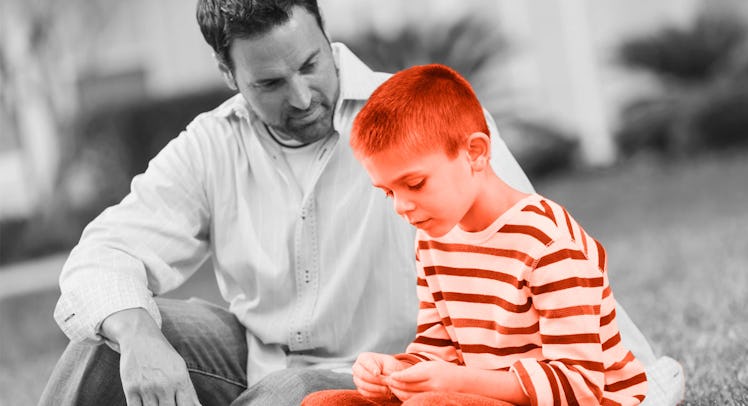What, Exactly, Is the Difference Between Discipline and Punishment?
One is a system that allows parents to share the family’s values with a child, the other is a way to help show those values matter.

Discipline and punishment are usually conflated so that in the mouths and minds of many parents, they’ve become interchangeable. They’re not. Because, in fact, discipline is a very useful system for parenting, while punishment is one tactic (of many) which can be used to support the discipline system. So while the two are complementary, they are neither interchangeable or opposed.
“When I think about discipline, I think about it more in terms of acting in accordance with standards,” says Dr. Nancy Darling, Chair of Psychology at Oberlin College. She notes that in a family those standards are crafted by parents and should ideally be based on the particular set of values a parent wants to pass down to a child like fairness, generosity and honesty. That’s where the kid comes in. “Discipline is the same root as ‘disciple.’ They’re following,” Darling explains.
RELATED: 11 Long-Term Benefits of Disciplining Your Kids
While it’s important for a kid to follow the standards laid out by parents, it’s not helpful to think of discipline as a one-way system that flows from parent to child. It’s far more holistic than that. “In parenting you want your values and behavior to be one,” says Darling. “One of the nice things about a well-disciplined family is that everyone is acting in the best interests of everyone else. The family is acting as one.”
Acting as one, within a system of discipline is what helps a child internalize the values that a parent wants to pass down. Of course, kids don’t just suck this stuff up via some kind of psychic osmosis. “That’s what punishment aides you in doing,” says Darling. “It’s not that you want the kid to comply when you’re there to punish or reward them. You want to teach them what appropriate behavior is so that they act in accordance to their own values — which are also yours.”
MORE: Effective Discipline Strategies for Kids with ADHD
To do this, it is essential to be clear on the definition of reward and punishment in the context of discipline. Rewards are mechanisms to increase a behavior a person would like to see; punishments decreases the likelihood of the behavior in the future. In other words, it’s all about outcomes, which means that sometimes a supposed punishment can be counter productive.
“For instance,” offers Darling. “If a parent threatens to punish a child, but the child engages in the behavior and the parent does not punish the child, the empty threat has become a reward.”
Essentially, if the behavior isn’t curbed then the punishment isn’t a punishment. But on the other side of the coin, reward is useless if the kid doesn’t care. That’s why it’s important for families to act as one, secure in the knowledge they’re looking out for each other. It helps a child build respect.
Darling notes that the best parents can punish or reward with a simple look. Those aren’t parents of children who are somehow cowed and afraid. They are parents of children who give a crap about what their parent thinks of them — parents who have a discipline system built on explicitly stated values that a kid understands are about love and support at their core.
Read more of Fatherly’s stories on discipline, punishment, and behavior.
This article was originally published on